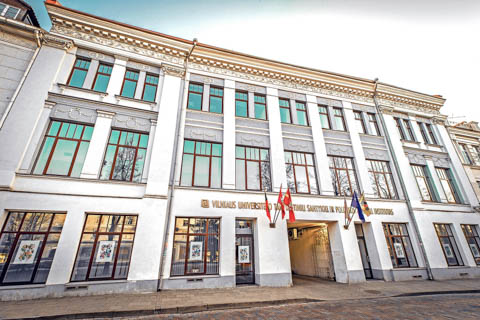|
|
Faculty
Institute of International Relations and Political Science
|
|

|
Scope of studies and length
120 ECTS credits, 2 years
|
|

|
Qualification awarded
Master in Social Sciences
|
|

|
Application period
15 December - 15 March (23:59 CET) |
|

|
Language
English
|
|

|
Tuition fee per year*
4 606 EUR
|
|

|
Start of studies
October
|
 |
City
Vilnius
|
APPLY NOW
The Joint Master’s programme in European studies provides the opportunity to find the best solutions through an interdisciplinary approach. This is a great opportunity to study Europe with lecturers from the four forefront European universities (University of Granada, University of Graz, Leipzig University and Vilnius University), and develop soft skills that will flourish in your future career.
Programme structure
| Course unit title |
ECTS
credits
|
|---|
| Course unit title |
ECTS
credits
|
|---|
|
1 semester
Module 1: Introduction to European Studies: Methods,Traditions and Future Challenges to Knowledge Production about Europe
1 joint online course, 1 local seminar
Module 2: Europeanisation under the Global Condition – History, Economics and Politics
1 joint online course, 1 local seminar
Module 3: Europe and Law
1 joint online course, 1 local seminar
|
30.0
10.0
10.0
10.0
|
|
2 semester
Module 4: European Foreign Policies
1 joint online course (summer school or other course), 1 local course
Module 5: Regions in Europe
2 local optional courses
Module 6: Social Transformations in Europe
2 local optional courses
|
30.0
10.0
10.0
10.0
|
|
3 semester
Module 7: Europe and Development: Developmental Policies
1 joint online colloquium, 1 local course
Module 8: Global Challenges and European Answers
2 local optional courses
Module 9: Cultural Representation in Current European Societies
2 local optional courses
|
30.0
10.0
10.0
10.0
|
|
4 semester
Module 10: Internship or 1 local optional course
Module 11: Joint Online Colloquium: Europe as a Global Actor
Module 12: Master‘s Thesis
|
30.0
5.0
5.0
20.0
|
Key Learning Outcomes
- Knowledge and advanced understanding of the complex processes of European integration, Europeanization and globalization.
- Knowledge and understanding of as well as an ability to explain how global and regional events shape Europe’s and Europeans’ role as (a) global actor(s)
- Knowledge and understanding of European institutions and decision-making policies and ability to conduct their independent scholarly analysis
- Familiarization with different academic ways of looking at a variety of European actors and the correlation to processes of globalization
Programme Specific Requirements
- BA degree in various fields of Humanities and Social Sciences (could be in related fields in Life or Natural Sciences that focused on societal aspects of technological transformation, climate change and public/global health and convincing explanation and strong motivation present)
- English language proficiency at a level not lower than B2
- The selection criterion is based on the weighted average of all the grades recorded in the transcript of the applicant’s academic report, motivation, academic potential, work experience/professional qualifications.
Why choose this programme?
- Study different dimensions of Europe’s positioning in global processes and contexts
- Gain a deep and well-rounded knowledge of European history, culture, politics, and philosophy, and will be able to apply it in practice
- Develop general and professional skills for a wide range of possible future employment in a global society
- Develop the necessary social and communicative skills to work both independently and in collaboration with others, in a profoundly multidisciplinary and multicultural context
|
What comes after?
- Become a professional in intergovernmental institutions or public administration
- Pursue career in journalism
- Go for doctoral studies and start career in academia.
|
